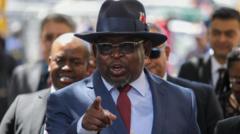South Africa is navigating political uncertainty as the government grapples with major divisions related to the national budget tabled after a prolonged delay. Analysts warn that tensions within the coalition government, headed by Finance Minister Enoch Godongwana, could spell trouble ahead.
The African National Congress (ANC) has found itself in a precarious position after losing its parliamentary majority in the last election and forming a Government of National Unity (GNU) with nine other parties. Key coalition partner, the Democratic Alliance (DA), has expressed strong disapproval for Godongwana’s budget, making it challenging to secure the votes needed for passage.
Godongwana’s budget announcement had initially been postponed due to fierce opposition, particularly against a proposed increase in value-added tax (VAT) proposed to tackle escalating costs, which would have further impacted South Africans already facing a cost-of-living crisis. As a response to the backlash, the finance minister scaled back his original proposal, suggesting a gradual VAT hike from 15% to 16% over two years.
The finance minister justified the need for tax increases to address urgent funding requirements in essential sectors such as health, education, and security, asking coalition partners to consider the implications of failing to act through potential cuts to services or job losses. However, the DA firmly rejected his offer, insisting that any tax hikes must be paired with substantial economic reforms aimed at growth and job creation.
President Cyril Ramaphosa’s reputation as a compromise builder is under strain, with only the minor Patriotic Alliance (PA) backing the revised budget thus far. This ongoing deadlock underscores the escalating tensions and disagreements within the coalition, particularly on contentious issues, including a land law criticized by the DA as unconstitutional.
As Public sentiment mounting against the budget’s proposed tax increases, the two main opposition parties, including former President Jacob Zuma's Umkhonto weSizwe (MK) and Julius Malema's Economic Freedom Fighters (EFF), have also rejected the budget, raising concerns about its effects on the poor.
Political analysts, like Thokozile Madonko from Wits University, emphasize the critical role of parliament in either accepting, altering, or rejecting the budget. For the ANC, the current situation represents unprecedented challenges, as past maneuvers to push through policies are no longer viable.
Critics of Godongwana suggest the plan relies on ineffective measures, asserting that a fair financial strategy would have targeted wealth tax on high-income earners rather than universal tax hikes. Calls for accountability are echoed by experts demanding clear, actionable plans rather than vague promises for job creation, with unemployment already exceeding 30%.
Godongwana’s long-standing reputation as a stabilizing force faces jeopardy as he must maneuver through this turbulent landscape while maintaining his credibility and authority.
The African National Congress (ANC) has found itself in a precarious position after losing its parliamentary majority in the last election and forming a Government of National Unity (GNU) with nine other parties. Key coalition partner, the Democratic Alliance (DA), has expressed strong disapproval for Godongwana’s budget, making it challenging to secure the votes needed for passage.
Godongwana’s budget announcement had initially been postponed due to fierce opposition, particularly against a proposed increase in value-added tax (VAT) proposed to tackle escalating costs, which would have further impacted South Africans already facing a cost-of-living crisis. As a response to the backlash, the finance minister scaled back his original proposal, suggesting a gradual VAT hike from 15% to 16% over two years.
The finance minister justified the need for tax increases to address urgent funding requirements in essential sectors such as health, education, and security, asking coalition partners to consider the implications of failing to act through potential cuts to services or job losses. However, the DA firmly rejected his offer, insisting that any tax hikes must be paired with substantial economic reforms aimed at growth and job creation.
President Cyril Ramaphosa’s reputation as a compromise builder is under strain, with only the minor Patriotic Alliance (PA) backing the revised budget thus far. This ongoing deadlock underscores the escalating tensions and disagreements within the coalition, particularly on contentious issues, including a land law criticized by the DA as unconstitutional.
As Public sentiment mounting against the budget’s proposed tax increases, the two main opposition parties, including former President Jacob Zuma's Umkhonto weSizwe (MK) and Julius Malema's Economic Freedom Fighters (EFF), have also rejected the budget, raising concerns about its effects on the poor.
Political analysts, like Thokozile Madonko from Wits University, emphasize the critical role of parliament in either accepting, altering, or rejecting the budget. For the ANC, the current situation represents unprecedented challenges, as past maneuvers to push through policies are no longer viable.
Critics of Godongwana suggest the plan relies on ineffective measures, asserting that a fair financial strategy would have targeted wealth tax on high-income earners rather than universal tax hikes. Calls for accountability are echoed by experts demanding clear, actionable plans rather than vague promises for job creation, with unemployment already exceeding 30%.
Godongwana’s long-standing reputation as a stabilizing force faces jeopardy as he must maneuver through this turbulent landscape while maintaining his credibility and authority.


















